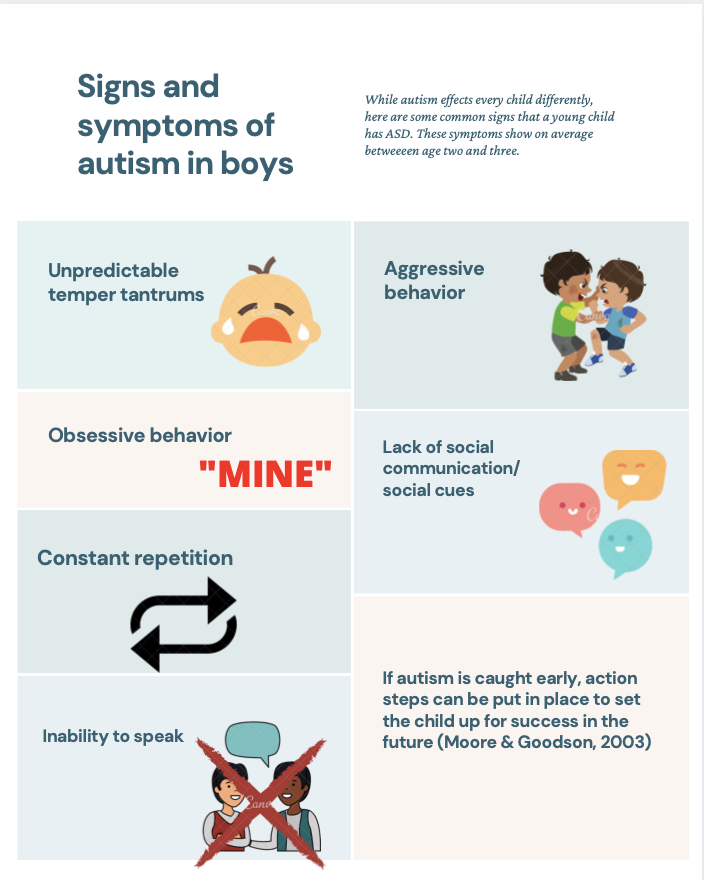Creating strong social bonds with help from an Autism Therapist
Creating strong social bonds with help from an Autism Therapist
Blog Article
Key Symptoms And Signs to Identify in People With Behavioral Autism
When you run into somebody with behavior autism, recognizing vital indications and symptoms is essential. Furthermore, sensory level of sensitivities can lead to overwhelming experiences.
Obstacles in Social Interactions
When you communicate with a person on the autism range, you could notice they deal with social signs and communication. These obstacles can make social interactions really feel frustrating for them. You may see them preventing eye contact or standing too close or also far away throughout discussions, which can create misunderstandings. They might not notice body movement or facial expressions, making it harder for them to assess just how others are feeling.
Furthermore, you may discover that they prefer routines and familiar settings, which can restrict their readiness to involve in brand-new social situations. They might talk concerning their interests in great information without observing if you're interested when they do engage. This can result in discriminatory discussions that leave you really feeling detached. Recognizing these challenges can aid you approach communications with empathy and patience, cultivating a much more comfortable environment for both of you.
Difficulty With Verbal and Non-Verbal Interaction

Identifying these indicators is crucial, as it helps you far better support and engage with individuals on the autism range. By understanding their interaction challenges, you can foster more meaningful links and provide a much more supportive atmosphere.
Repetitive Behaviors and Routines
Interaction challenges typically go along with other indicators of autism, such as repetitive actions and a strong preference for regimens. You could notice that people with autism frequently take part in certain, repetitive activities, like hand-flapping, rocking, or duplicating expressions. These actions can offer comfort and a sense of control in an usually frustrating world.
Routines are equally essential; numerous individuals prosper when they comply with an organized routine. You may find that modifications to these routines can lead to significant distress. If they have a daily routine of consuming breakfast at a details time or adhering to a particular path to college, any kind of interruption can trigger anxiety.
Acknowledging these patterns helps you understand their behavior and provide assistance. By suiting their demand for routine and permitting recurring activities, you can develop an extra comfy environment that alleviates their challenges.
Sensory Sensitivities

Common Sensory Triggers
Sensory level of sensitivities can significantly influence day-to-day life for individuals with autism, as specific stimulations commonly activate frustrating reactions. Common sensory triggers include loud noises, bright lights, and strong scents. Comprehending these triggers can help you manage your atmosphere much better.
Behavioral Responses Explained
Comprehending your behavior actions to sensory level of sensitivities is important, as they frequently disclose just how you connect with the world. You may observe that certain audios, lights, or textures bewilder you, bring about anxiousness or pain. When encountered with these stimuli, you might withdraw, cover your ears, or perhaps respond strongly. These responses aren't just peculiarities; they're your means of dealing with overstimulation. You may additionally discover on your own seeking particular sensory experiences, like deep pressure or quiet environments, to assist ground yourself. Acknowledging these patterns helps you understand your needs much better and can assist just how you communicate them to others. By acknowledging your sensory sensitivities, you can work towards creating an atmosphere that really feels much more comfortable and convenient for you.
Coping Approaches Summary
Recognizing your sensory level of sensitivities is just the initial step; now it's time to discover coping strategies that can assist you manage those experiences effectively. Begin by creating a sensory toolkit tailored to your needs. Developing an organized routine can also offer predictability, decreasing anxiousness around sensory overload.
Limited Interests and Emphasis
While several individuals establish a vast array of rate of interests, those with autism commonly show limited passions and an extreme emphasis on certain topics. You may discover that a person with autism can invest hours diving into their preferred topic, whether it's a certain sort of train, a certain film, or a scientific idea. This extreme emphasis isn't just a hobby; it can come to be a main component of their identity and social interactions.
You might locate that conversations rotate around these interests, and they might battle to involve in wider topics. By understanding and recognizing these restricted rate of interests, you can cultivate an encouraging environment where they really feel valued and recognized, enabling for even more purposeful links and communications.
Emotional Guideline Troubles
People with autism typically face challenges in emotional law, which can be influenced by their extreme emphasis on certain rate of interests. You might notice that when an individual is deeply taken part in a favored activity, they can experience solid feelings, whether enjoyment or disappointment. This intensity sometimes makes it tough for them to change gears or handle their feelings when points do not go as intended.

Variability in Developmental Landmarks
When it comes to developmental turning points, you'll observe that individuals with autism typically show a broad variety of irregularity. You may see a kid stand out in language skills but battle with social interactions.
It's important to recognize that each person's journey is great post to read unique. Observing these patterns can help you comprehend their strengths and needs much better.
Often Asked Concerns
Exactly How Is Autism Diagnosed in Kid and Adults?
To detect autism in grownups and kids, specialists examine behavior, interaction skills, and social interactions. If an individual satisfies the criteria for autism range disorder., they commonly use standard tests, meetings, and observations to establish.
Are There Various Sorts Of Autism Spectrum Disorders?
Yes, there are various kinds of autism range disorders, including Asperger's disorder and pervasive developing disorder-not or else specified. Each kind varies in intensity and characteristics, so comprehending these distinctions can aid you better assistance individuals with autism.
What Therapies Work for Individuals With Autism?
When taking into consideration effective treatments for people with autism, you'll find options like Applied Habits Evaluation, speech therapy, and job-related therapy. Each technique can help improve interaction, social skills, and day-to-day operating customized to specific needs.
Can People With Autism Lead Independent Lives?
Yes, individuals with autism can lead independent lives. With the appropriate assistance, skills training, and sources, you can assist them develop self-sufficiency, handle pop over to this site everyday jobs, and grow in various environments, fostering their independence.
Just How Can Families Support Liked Ones With Autism?
You can sustain your enjoyed ones with autism by developing a structured atmosphere, encouraging their passions, exercising perseverance, cultivating interaction, and advertising social abilities. Commemorate their success, regardless of just how tiny, and construct an encouraging neighborhood.
Although several people on the autism range can utilize and comprehend language, they commonly face significant challenges with both non-verbal and spoken interaction. Identifying these indicators is vital, as it assists you much better support and engage with individuals on the autism range. You could observe that individuals with autism frequently engage in specific, repetitive activities, like hand-flapping, rocking, or repeating expressions.Sensory sensitivities can significantly impact day-to-day life for people with autism, as specific stimuli typically activate overwhelming responses.When it comes to developmental milestones, you'll see that individuals with autism often reveal a large range of irregularity.
Report this page